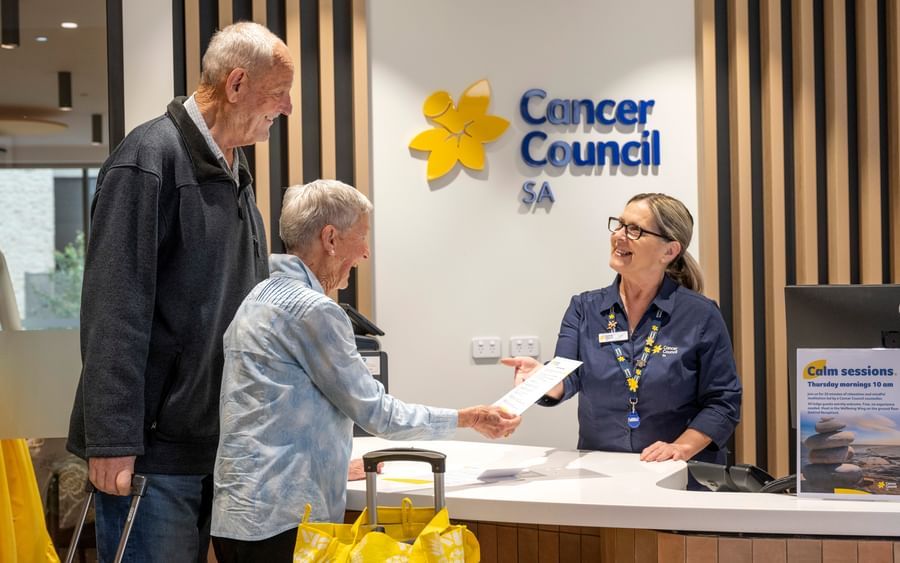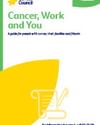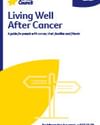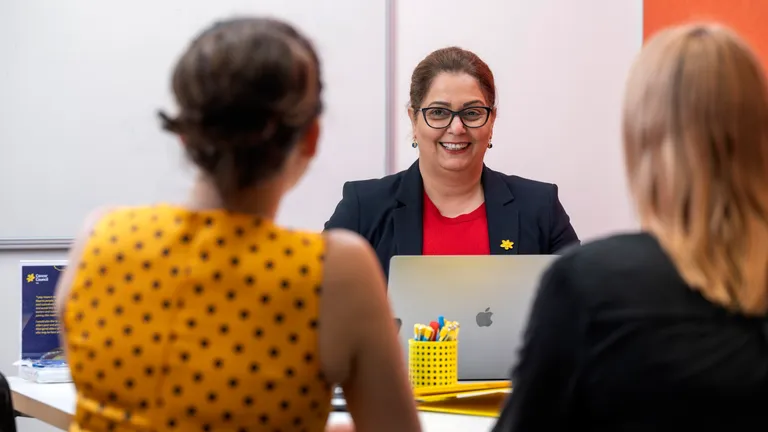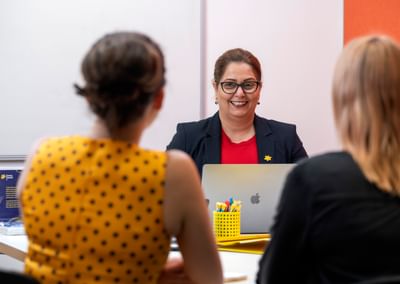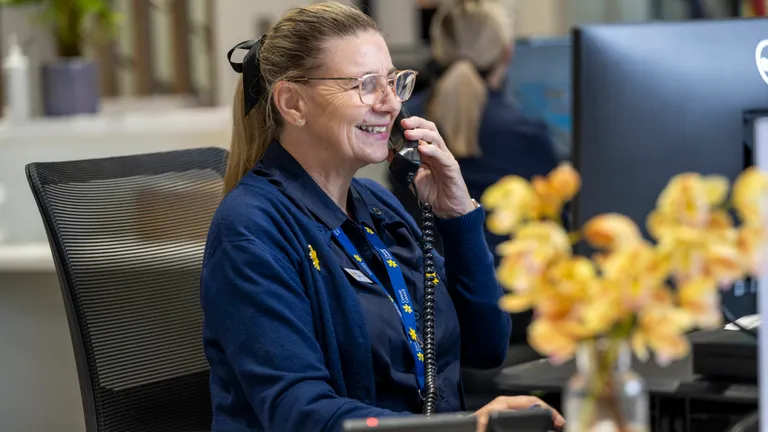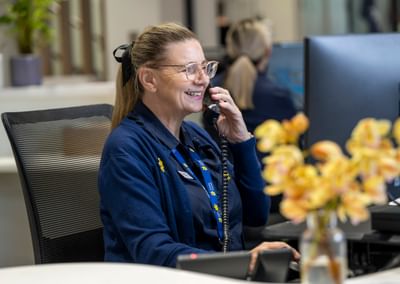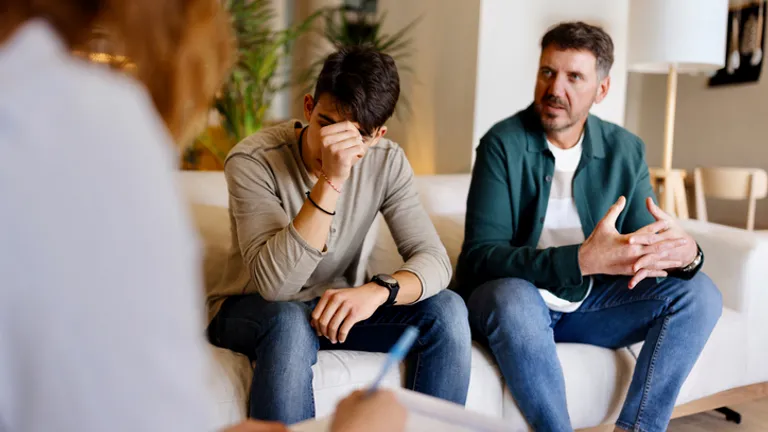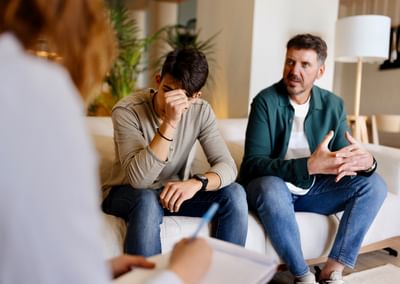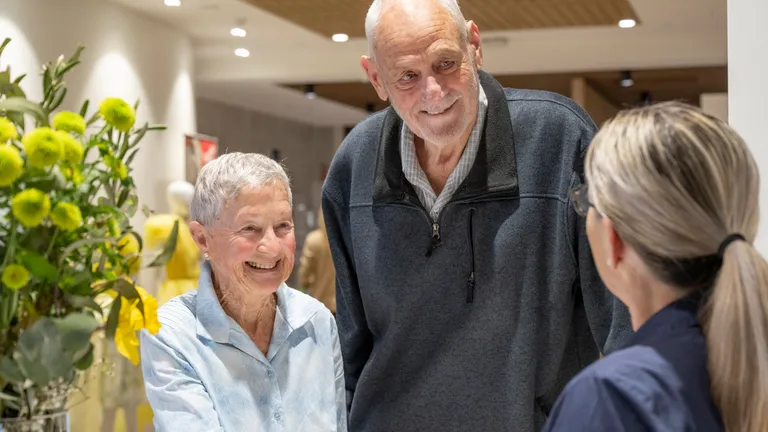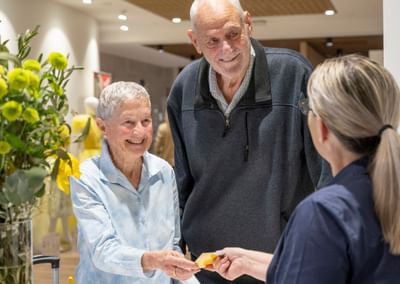This information has been compiled to help give rural and regional people who need to travel to Adelaide or another major city for treatment some tools to help with:
- making decisions about treatment
- preparing to leave home
- emotional support while away from home
- getting to treatment in Adelaide
- communicating with your healthcare team
- managing your finances
- finding support when you return home.
This is a joint initiative involving country people with lived experience of cancer from across rural South Australia, Kate Gunn, Country Health SA, Cancer Council SA, the Spencer Gulf Rural Health School and the University of Adelaide.
Cancer Council SA’s Greenhill Lodge accommodation
We’re here for every South Australian impacted by cancer, no matter where they live. Greenhill Lodge provides a home away from home for regional South Australians who need to travel to Adelaide for treatment and cancer-related appointments.
Greenhill Lodge is located at 202 Greenhill Road Eastwood and provides 120 rooms of supported accommodation, alongside a range of onsite support services, Transport to Treatment, kitchen and dining facilities, and communal spaces.
Patient Assistance Transport Scheme subsidy
If you are required to travel over 100 kilometres for medical appointments, you may be eligible for the State Government’s Patient Assistance Transport Scheme (PATS). PATS can contribute to the cost of your accommodation and travel, including air travel authorised by your specialist if required.
To apply for the subsidy, ask your doctor about the scheme and have them fill out the form for you.
Making decisions about treatment
If you are living with cancer, you may have to make challenging decisions about your treatment. For people living in rural and regional areas, this can be especially difficult as you will likely need to travel to a larger city, which can bring uncertainty around costs, logistics, and emotional support.
It’s important to consider, plan for and seek support regarding where to stay and how you’ll get there, time off work, the disruption to your normal routine and being away from family and friends.
When making decisions about your treatment, it is important to remember that there are a number of support services available that can support you when deciding how to get there and where to stay.
Being well prepared can help reduce some of the worry and anxiety associated with treatment. Have a discussion with your doctor about the decision and ensure you completely understand the costs and benefits of all treatment options available to you.
Other services that may be able to help include:
- Cancer Council SA on 13 11 20 to speak to a qualified health professional about any questions you may have and connect you with services that can help.
- Cancer Care Coordinators/Patient Liaison Nurses may be available in your region to support you with navigating the medical system. Ask your doctor or local health team about whether there are Cancer Care Coordinators or Patient Liaison Nurses in your local area.
- Royal Adelaide Hospital’s Rural Liaison Nurses, who can help you arrange accommodation, transport and return home.
- A social worker through your hospital, who can assist you with practical, financial and emotional issues while you undergo treatment. If you’re staying at Cancer Council SA’s Greenhill Lodge we also have onsite social workers who can help.
Preparing to leave home for treatment
There are a number of things you can do before you leave home for treatment to ensure you feel more prepared:
- Ask your local doctor about the Patient Assistance Transport Scheme (PATS) and get them to fill in the form for you.
- Ask your local doctor if there is a Cancer Care Coordinator at your local health service who may be able to help you.
- Speak to your doctor if you are having trouble sleeping or are in pain.
- Make arrangements for people to keep an eye on your house, pets or garden while you’re away.
- Download the app Gather my Crew to organise family, friends and community support.
- Let your employer, volunteer, and social groups know you’ll be away.
- Consider obtaining ambulance cover if you don’t have it already, to avoid costly transport. Visit SA Ambulance Service or contact them on 1300 13 62 72 to organise cover.
- If you have children, consider letting their school counsellor or classroom teacher know about your circumstances to ensure they are supported at school.
- Write down your current medications, and key medical history.
- If you feel well enough, try to do a little gentle exercise such as walking.
- Eat a nutritious and balanced diet.
Your travel checklist
If you are travelling to Adelaide for treatment, it’s important to remember to bring the following items with you to assist your health care team, and make your experience more comfortable:
- referrals
- x-rays/scans
- a list of current medications (prescription, non-prescription including travel sickness pills and any alternative medicines)
- Medicare, Pension, Health Care, Veterans Affairs and Pharmaceutical Safety Net cards
- photo identification, such as your driver’s license or passport (this is especially important if you’re travelling by bus or air)
- phone numbers of your health professionals, family members and friends
- money or debit/credit card
- hospital admissions paperwork
- Patient Assistance Transport Scheme (PATS) form, completed by your local doctor
- private health insurance details
- notes/letters/reports from your doctors
- toiletries
- clothes
- pyjamas, dressing gown, slippers
- reading material, laptop, tablet/iPad, mobile
- glasses and mobility aids (if required).
Emotional support while undergoing treatment away from home
Undergoing cancer treatment can be an overwhelming and emotional time and this is often made even more challenging if you’re away from home and your usual support networks. Maintaining a support network throughout your treatment is important for your emotional and mental wellbeing.
Here are some tips to help you reduce feelings of loneliness and isolation while undergoing treatment away from home:
- Speak to other people at the hospital or accommodation facilities – discussing how you are feeling with someone who also shares a similar diagnosis to you can be a good way to connect with someone who understands the emotions you may be feeling.
- If you’re staying at Cancer Council SA’s Greenhill Lodge, talk to one of our social workers, who can offer a safe and confidential space to talk about your concerns or worries.
- If you’re well enough, check out some local attractions and community events – The City of Adelaide website is a great resource to see what’s happening in the CBD and surrounding suburbs.
- If you have your own smart phone or laptop and are staying at Cancer Council SA’s Greenhill Lodge, you will be able to access WiFi – so you can set up video chats with your family and friends via applications like Zoom and Microsoft Teams.
- Counsellors may be able to assist you to cope with any difficult emotions you may be experiencing by offering advice and support – your specialist or doctor may be able to refer you to a private counsellor. Cancer Council SA on 13 11 20 may also be able to connect you with one of our trained cancer counsellors.
- If you’re staying at Cancer Council SA’s Greenhill Lodge check the noticeboards for group outings, which offer social connection with other guests who are also undergoing treatment.
Mental health support services
We understand this may be overwhelming, but support is available:
- Cancer Council SA’s qualified health professionals are here on 13 11 20 for information and support Monday to Friday, 9.00 am to 5.00 pm.
- Visit SA Health to see the range of specialist mental health services available in your area.
- If you require urgent mental health assistance you can call the Rural and Remote Distance Consultation and Emergency Triage and Liaison Service on 13 14 65 – 24 hours a day, seven days a week. This service offers trained counselling and support from mental health experts to those in rural and remote communities impacted by cancer.
- Call Lifeline on 13 11 14 for 24-hour mental health support.
Getting to treatment in Adelaide
The idea of travelling to a hospital for your treatment or appointments when you don’t live locally may be overwhelming.
If you don’t have a car or someone to drive you, there are a number of transport programs and options that may assist you and your family to get to and from your appointments safely:
- If you are staying at Cancer Council SA Greenhill Lodge, you may be able to access the Transport to Treatment service. Our free, volunteer-run bus service transports guests from Greenhill Lodge to a limited number of metropolitan medical centres and hospitals.
- For people with blood cancers, the Leukaemia Foundation offers transport support to help you get to and from treatment appointments by providing fuel, taxi, Uber or parking vouchers, and connect you with other transport providers in your area. To apply, complete the Transport Application Form or phone 1800 620 420.
- The Australian Red Cross provides transport to attend non-urgent medical appointments, when no other means of transport is available. To find out more and to see eligibility requirements visit their website.
- Check with your treating hospital to see if they have any transport services available for patients and their carers.
- Catching a bus, tram or train to treatment and appointments is a cost-effective way to get around the city and suburbs. For information about public transport routes, timetables and ways to pay your far visit Adelaide Metro.
- There are a number of taxi companies servicing Adelaide. You will find taxi ranks located at most hospital entrances. If you are staying at Cancer Council SA’s Greenhill Lodge, we have taxi buttons in our transport lounge to help you organise a taxi easily.
- Adelaide Independent Taxis phone 13 22 11
- Suburban Taxis phone 13 10 08
- 13cabs phone 13 22 27
- Access Taxis (cater for wheelchair users or people with mobility issues and disabilities) phone 1300 360 940.
- Smartphone apps, such as Uber, can provide affordable car rides to the hospital or Cancer Council SA’s Greenhill Lodge.
Whilst parking is available at most hospitals, it can be expensive. If you need to attend a public hospital on a regular basis, for example whilst having chemotherapy or radiotherapy treatment, speak to your treatment team about assistance to help cover the costs of parking. If you aren’t eligible for any assistance, it may be worth asking if you can negotiate a weekly or discounted rate.
Communicating with your healthcare team
Going to see your specialist for the first time can be quite daunting, but one way to help is to take a list of questions with you to ask the doctor. You can refer to this list for an idea of some questions you may like to ask.
Questions unique to country cancer patients may include:
- How do you plan to structure my treatment (when, what, where and whom)?
- What should I do if I experience these symptoms in the middle of the night?
- Is there a member of my treatment team I can contact? Can you please write down the relevant phone number for me?
- Would it be helpful for me to stay in Adelaide with family or friends for a while before returning home?
- How will I get home, and will I need to make my own transport arrangements?
- What type of care and equipment will I need when I get home (e.g. dressings, shopping, cleaning)?
- Who will provide the care and equipment I need when I get home?
- Can my follow up appointments be held at my home or will I need to come back to Adelaide again?
Make sure you keep track of your treatment plans from all the different health professionals you meet with by keeping a diary or writing these plans down. Your treatment team may also be able to provide helpful printed fact sheets to take home.
And remember, don’t feel rushed and make sure you get answers to your questions.
Social workers may be able to help you deal with practical, financial and emotional issues, while you undergo treatment. Social work services may be available to public hospital patients and their families and friends to help them deal with the issues they face. You can ask your treating team to refer you. If you are a guest at Cancer Council SA’s Greenhill Lodge speak to reception about organising a meeting with an onsite social worker.
Managing your finances
After a cancer diagnosis, many people worry about how they will manage the financial impact, especially if they have to travel to Adelaide for treatment.
To help manage your financial security, we recommend considering the following before you begin treatment:
- Speak to your employer or boss about taking leave, leave entitlements and flexible working arrangements (if applicable).
- Contact your superannuation fund to find out if you are eligible to claim income protection, trauma insurance or if you are able to access your superannuation funds early.
- Contact Centrelink to see if you are eligible for any financial support.
- Visit SA Health for information on the Patient Assistance Transport Scheme (PATS).
- Discuss your situation with your utility providers (e.g. gas, water, electricity), banks and other lenders – they can make allowances for people experiencing financial hardship to see if compassionate arrangements can be made.
- Obtain free financial advice through the National Debt Helpline.
- Visit the Money Smart website for a list of free financial counselling services.
- Head to the Medicare website or phone 132 011 for advice on what medical expenses are covered and how much you’ll be reimbursed.
- If you’re being treated as a private patient, speak with your health care fund to ensure you understand what you’ll be covered for.
- Have a free and confidential discussion with Affordable SA.
- Speak to a social worker in your treating hospital about your situation – they may be able to suggest financial assistance you could be eligible for.
- Call Cancer Council 13 11 20 to check your eligibility for legal and financial assistance.
Finding support when you return home
So, you’ve finished your cancer treatment and are finally heading home. It can be a time of mixed emotions: relief, but also nervousness and uncertainty. Don’t forget that support is still available after treatment to help you manage your physical and emotional wellbeing.
Talk with your treatment specialist and local doctor about managing your health and wellbeing after treatment. Nursing and medical staff at your hospital or cancer centre may be able to recommend and organise ongoing support for when you get home, so it’s important to let them know you would like support.
After undergoing cancer treatment, daily activities can often become more challenging, particularly if you have limited mobility or experience fatigue or other side effects from your treatment.
Options to help make life a little easier during your recovery
Order your shopping online (if this is available in your local area)
Have your groceries delivered straight to your door. This is a quick and easy way to ensure your fridge and pantry are stocked with nutritious food, without having to worry about going to the supermarket or shopping centre yourself.
Organise a meal delivery service
Take the hassle out of shopping for and preparing meals, while helping you maintain a healthy and balanced diet. The delivery itself also offers social interaction, which can combat feelings of isolation and loneliness. Speak to your doctor, community nurse or local council about meal delivery options available in your community.
Purchase pre-cooked frozen meals
Reduce preparation and cooking time. Most supermarkets have a variety of meal options in their freezer section to suit your tastes and preferences.
Ask a friend or neighbour to run some errands for you
Asking for help with daily activities like buying your groceries can make all the difference.
Consider enlisting some help for tasks around your house
You may be able to find domestic assistance providers such as cleaners and gardeners in your area in the local newspaper on noticeboards, online or by contacting your local council. Staff at your local hospital may also be able to recommend providers of this support.
Community support
Your doctor, community nurse or local council may be able to link you to these services.
Call Cancer Council 13 11 20
Speak with one of our caring and qualified health professionals who can offer support, advice and assistance about coping with the impact of cancer. Our team can also discuss programs and support services that may benefit you upon your return home.
Looking after your emotional wellbeing after treatment
Returning home after completing cancer treatment can often be met with a myriad of emotions – from relief, to uncertainty, confusion and loneliness. Looking after your emotional wellbeing is just as important as your physical one, as it plays a vital role in how we deal with life’s ups and downs.
To help look after your emotional wellbeing, there are a range of supports available for you and your loved ones:
- Call Cancer Council 13 11 20 to speak to a qualified health professional for general advice on managing side effects of treatment and for emotional support.
- Cancer Council SA’s Cancer Connect - Telephone Peer Support Program matches you with a volunteer you can call who has been through a similar cancer experience.
- Cancer Council SA operates a free Counselling Service, over-the-phone or online for people who have had cancer treatment, carers, family members or close friends.
- Join a telephone support group or see if there are any face-to-face support groups in your area.
- Join our Cancer Council Online Community.
- If you require urgent mental health assistance, phone the Rural and Remote Distance Consultation and Emergency Triage and Liaison Service on 13 14 65.
- Ask your doctor for an ongoing referral to a mental health professional.
This information has been compiled through a joint initiative involving cancer patients from across rural South Australia, Kate Gunn, Country Health SA, Cancer Council SA, the Spencer Gulf Rural Health School and the University of Adelaide.
